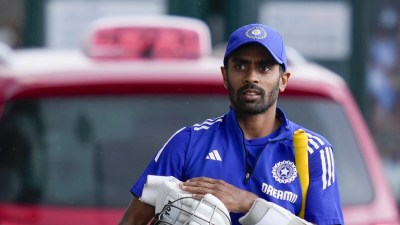Covid testing numbers could come down in the days ahead as the Delhi government shifts focus on testing only those with symptoms of the virus or those referred by doctors. This comes following a change in Indian Council of Medical Research (ICMR) guidelines that no longer allows testing on demand.
Random testing of asymptomatic individuals being conducted at Metro stations, bus stops, markets, ISBTs and railway stations has been stopped and several districts have reduced the number of government Covid testing centres.

Government officials, however, voiced a note of caution and said the decision could have a significant impact on the home isolation system in place since asymptomatic cases can turn into super spreaders.
A senior official from the health department said, “The new ICMR guidelines do away with testing on demand, which was a huge chunk of the tests we were conducting. First, many who did not necessarily have symptoms were getting tested. Second, we were testing all contacts of a positive case. So, if we were testing 30 contacts for a positive case, now we would test a maximum of 10 — only those at a higher risk of developing severe disease.”
The official said mobile teams have stopped testing, except those deployed at the airport.
A senior government official added: “If people don’t follow Covid-appropriate behaviour, community spread will increase. During random tests, there were several people who were asymptomatic but tested positive.”
The ICMR issued the guidelines on January 10 and the Director, DGHS, circulated them the next day — after the Health Minister’s approval — to all district magistrates for implementation.
Story continues below this ad
The guidelines direct that in community settings, only symptomatic patients, at-risk contacts of laboratory confirmed cases, individuals undertaking international flights, and international travellers be tested. In hospital settings, only patients referred by doctors will be tested. Further, asymptomatic patients undergoing treatment/ surgery, including pregnant women nearing/in labour, will not be tested unless warranted or showing symptoms.
The health department official said, “Samples coming in from hospitals have gone down. Earlier, all patients were being tested before any procedure or admission. Now, ICMR guidelines clearly state that those who are asymptomatic need not be tested before procedures, surgeries or delivery. Keeping all these factors in mind, the number of samples has reduced in the government sector.” The official added that private labs were continuing to test samples of asymptomatic persons for now.
Another health department official said the objective behind the new guidelines is to reduce panic among the public: “Cases are increasing very rapidly but are mostly mild. This will also reduce load on labs which were testing thousands of samples a day. The harassment that asymptomatic people face in hospitals will be reduced. Recovery rate will increase as the focus is only on symptomatic patients.”
“District officials and their teams will ensure a protocol is in place to reduce asymptomatic cases and community spread. Night and weekend curfew will also be lifted gradually as cases come down,” added the official.
Story continues below this ad
Incidentally, Delhi conducted the highest number of RT-PCR tests (85,349) Wednesday just as the guidelines were issued, and the numbers were also more than 80,000 on Thursday. This, the official said, could be because of a lag period of a couple of days after collection of samples and the report being uploaded on the ICMR portal. On Friday, there was a dip and 64,183 RT-PCR tests were done.








